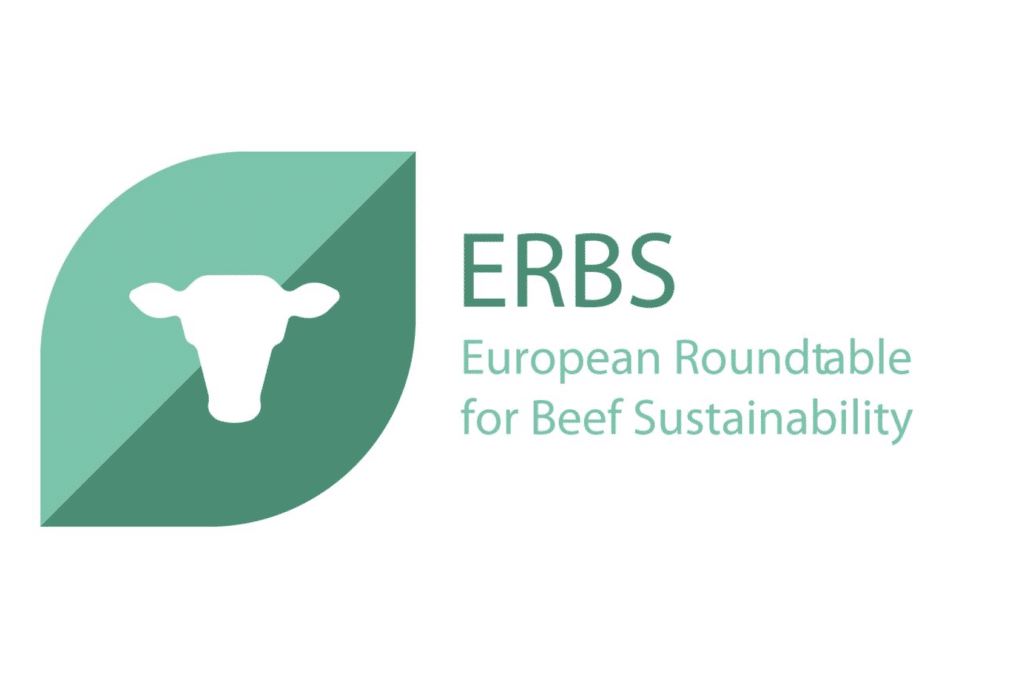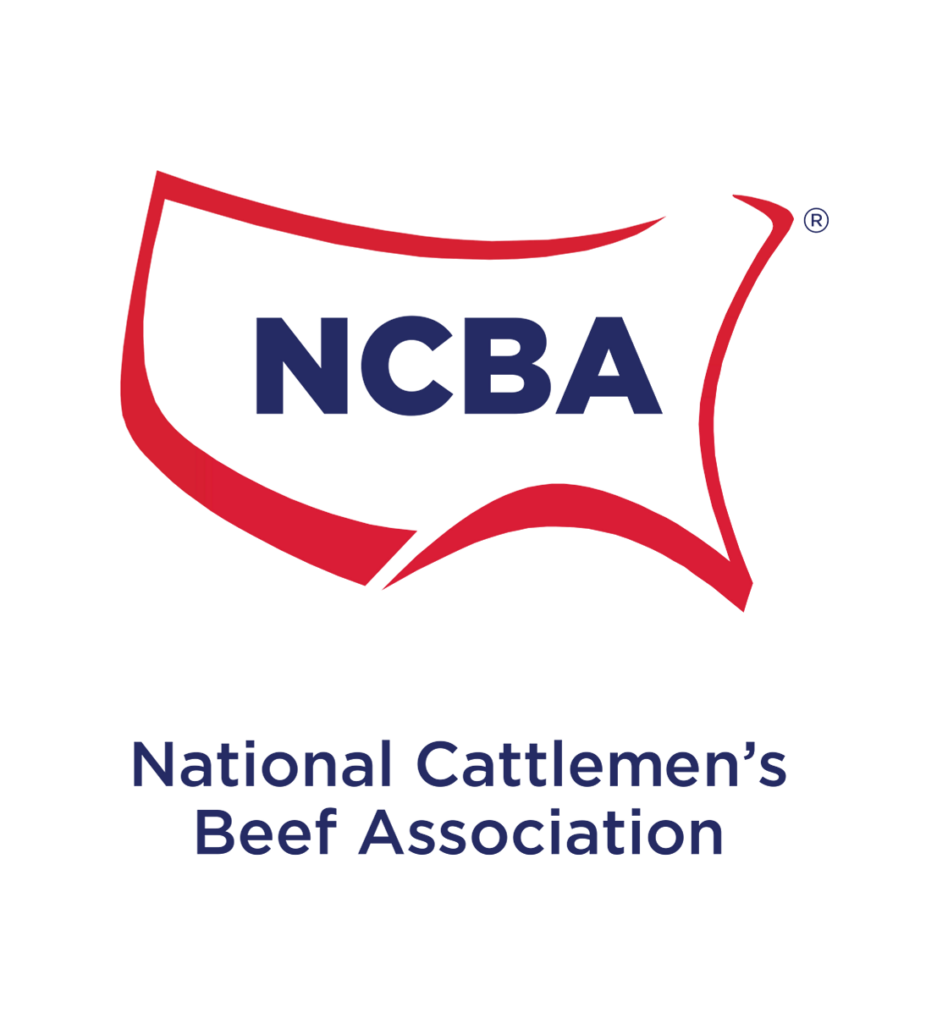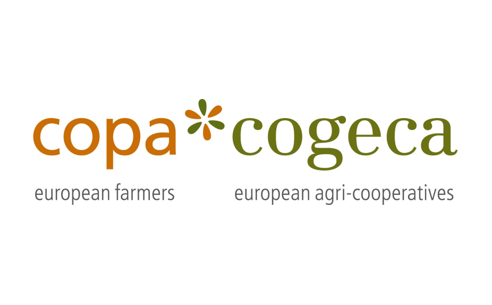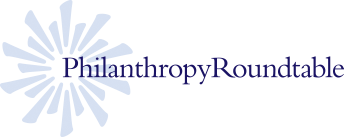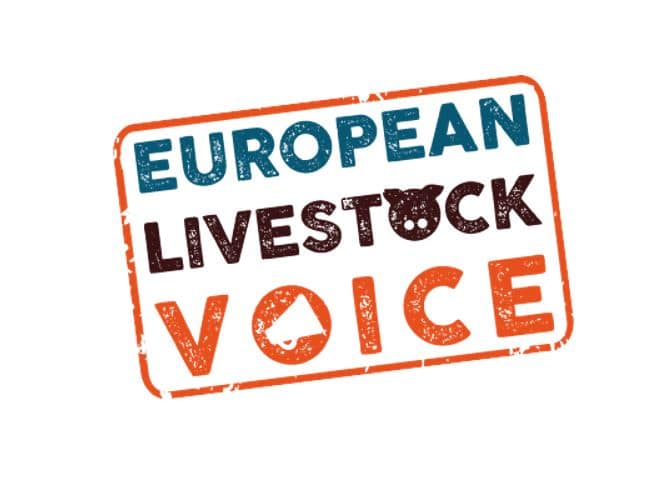Background
The European Roundtable for Beef Sustainability (ERBS) is Europe’s largest multi-stakeholder organisation focused on supporting more sustainable beef production,1“EUROPEAN ROUNDTABLE FOR BEEF SUSTAINABILITY,” Sai Platform. Archived July 15, 2021. Archive.ph URL: https://archive.ph/R6kQQ having launched in 2018 as a regional division of the Global Roundtable for Sustainable Beef (GRSB).2Breifne O’brien. “Spotlight on Ireland for European beef sustainability forum,” Agriland, October 11, 2018. Archived July 15, 2021. Archive.ph URL: https://archive.ph/LxDIk
The ERBS evolved out of the Sustainable Agriculture Initiative Platform (SAI Platform),3“Home Page,” Sai Platform. Archived July 15, 2021. Archive.ph URL: https://archive.ph/5bXEM a food industry initiative that runs a certification program called “Farm Sustainability Assessment.”4“FSA – FARM SUSTAINABILITY ASSESSMENT,” ControlUnion Certifications. Archived July 15, 2021. Archive.ph URL: https://archive.ph/41In3
With country-level platforms in France, Germany, Ireland, Italy, Poland, and the UK, the ERBS brings together existing beef initiatives5“FREQUENTLY ASKED QUESTIONS,” Sai Platform. Archived July 15, 2021. Archive.ph URL: https://archive.ph/dtIN8 and says it envisions “a world in which all aspects of the beef value chain are environmentally sound, socially responsible and economically viable.”6“EUROPEAN ROUNDTABLE FOR BEEF SUSTAINABILITY,” Sai Platform. Archived July 15, 2021. Archive.ph URL: https://archive.ph/R6kQQ
The ERBS works to achieve an intensity reduction of 15 percent in greenhouse gas (GHG) emissions by 20257“EUROPEAN ROUNDTABLE FOR BEEF SUSTAINABILITY,” Sai Platform. Archived July 15, 2021. Archive.ph URL: https://archive.ph/R6kQQ and to “enable different platforms in Europe to demonstrate that they have achieved or are making credible progress towards the ERBS’s eight outcome targets in their country.”8“Annual Report 2019,” Sai Platform. Archived July 15, 2021. Archive.ph URL: https://archive.ph/QN798
As of 2021, the ERBS is chaired by Claire Donoghue, Operations Director and European Head of Sustainability at the European regional office of OSI Group,9“European Roundtable for Beef Sustainability welcomes new Board Chair,” The Cattle Site, August 17, 2020. Archived July 15, 2021. Archive.ph URL: https://archive.ph/m8DvD a US-based holding company of meat processors10“OSI Group,” Forbes. Archived July 15, 2021. Archive.ph URL: https://archive.ph/dhH4j supplying brands such as McDonald’s, Chipotle and Burger King. Donoghue is a former manager at Irish meat producer Kepak Group.11Chloe Sorvino. “Meet The Secretive Billionaire Who Makes McDonald’s McNuggets, Burger King’s Impossible Whoppers And More,” Forbes, September 21, 2020. Archived July 15, 2021. Archive.ph URL: https://archive.ph/5COYU
Stance on Climate Change
The ERBS states that it is committed to achieving eight targets related to the environment, animal welfare, antibiotic use and farm management. The ERBS’s single environmental target is an intensity reduction of 15 percent in GHG emissions by 2025.12“EUROPEAN ROUNDTABLE FOR BEEF SUSTAINABILITY,” Sai Platform. Archived July 15, 2021. Archive.ph URL: https://archive.ph/R6kQQ
Key narratives
The ERBS promotes a number of narratives to justify the meat industry’s business model. Find out more about how the meat industry is climate-washing its activities in our investigation. And you can read counter-arguments and criticisms of these narratives in our factsheet.
‘Animal agriculture isn’t a serious driver of climate change’
‘Grazing is good for the environment and helps to sequester carbon’
According to the ERBS’s mission statement, “the beef value chain is recognised for delivering positive impacts, land stewardship, ecosystem benefits such as carbon sequestration and continuous improvement towards key sustainability priorities.”13“FREQUENTLY ASKED QUESTIONS,” Sai Platform. Archived July 15, 2021. Archive.ph URL: https://archive.ph/dtIN8
The idea of using cattle grazing to capture carbon in the soil has been criticised by environmental scientists from the University of Oxford, however, for offsetting only 20-60 percent of the total emissions, concluding that “grass-fed cattle remain net contributors to warming.”14Sally-Anne Stewart.“FOOD IN THE ANTHROPOCENE,” Oxford Martin School, May 2019. Archived July 14, 2021. Archive.ph URL: https://archive.ph/ojXqS A study on the concept of “grazed ecosystems,” also known as “holistic management,” further found that “the application of HM [holistic management] principles of trampling and intensive foraging are as detrimental to plants, soils, water storage, and plant productivity as are conventional grazing systems.”15John Carter et al. “Holistic Management: Misinformation on the Science of Grazed Ecosystems,” Hindawi, April 23, 2014. Archived July 15, 2021. Archive.ph URL: https://archive.ph/OWeNO
‘Cows convert inedible material into food for human consumption’
In a 2018 report, the ERBS argued that “the beef sector transforms inedible feedstuffs” into protein for human consumption.16“Uniting the European beef value chain to accelerate and communicate our sustainability journey,” Sai Platform. Archived July 15, 2021. Archive.ph URL: https://archive.ph/t3e6Q
A 2018 Science study estimates that the production of animal-based foods requires 83 percent of the world’s farmland yet provides only 37 percent of global protein and 18 percent of global calories.17J. Poore and T. Nemecek. “Reducing food’s environmental impacts through producers and consumers,” Science, June 1 2018. Archived July 14, 2021. Archive.ph URL: https://archive.ph/O6jDB According to a 2019 study by environmental scientists from Harvard University, a more plant-based food production system in the UK could free up large areas of pasture and cropland currently used for grazing and animal feed production while improving the country’s carbon footprint and meeting the population’s protein and calorie requirements.18Helen Harwatt and Matthew N. Hayek. “Eating Away at Climate Change with Negative Emissions,” Harvard Law School, April 11, 2019. Archived July 14, 2021. Archive.ph URL: https://archive.ph/8aWUr
‘Meat is needed for a healthy diet and to feed the world’
‘The beef sector provides high value protein’
In a 2018 report, the ERBS stated that “the beef sector has an important role to play in a sustainable food system” and provides “high value protein.”19“Uniting the European beef value chain to accelerate and communicate our sustainability journey,” Sai Platform. Archived July 15, 2021. Archive.ph URL: https://archive.ph/t3e6Q
According to the World Resources Institute (WRI), a sustainable development organisation, feeding 10 billion people by 2050 without transitioning to a more plant-based global diet20Tim Searchinger et al. “CREATING A SUSTAINABLE FOOD FUTURE,” World Resource Institute. Archived July 14, 2021. Archive.ph URL: https://archive.ph/awSZe would necessitate the destruction of the world’s remaining forests and “agriculture alone would produce almost twice the emissions allowable from all human activities.”21Damian Carrington. “Beef-eating ‘must fall drastically’ as world population grows,” The Guardian, December 5, 2018. Archived July 14, 2021. Archive.ph URL: https://archive.ph/Ltffu Meat and dairy products only provide 18 percent of global calories yet take up 83 percent of agricultural land and generate 60 percent of agriculture’s GHG emissions,22Damian Carrington. “Avoiding meat and dairy is ‘single biggest way’ to reduce your impact on Earth,” The Guardian, May 31, 2018. Archived July 15, 2021. Archive.ph URL: https://archive.ph/qWFZ0 according to a study published in Science.23J. Poore and T. Nemecek. “Reducing food’s environmental impacts through producers and consumers,” Science, June 1 2018. Archived July 14, 2021. Archive.ph URL: https://archive.ph/kR1zX
‘Innovations in animal agriculture will tackle climate change’
‘We are producing less emissions-intensive meat’
Out of the eight action areas developed by the ERBS, one goal concerns GHG emissions: “An intensity reduction of 15% in GHG emissions by 2025, with the aim of recognising the positive role beef production can contribute to mitigating climate change through reduction strategies and sequestration.” This means 15 percent fewer emissions would be generated per kilogram of beef produced, while the sector’s overall emissions could still rise.24“EUROPEAN ROUNDTABLE FOR BEEF SUSTAINABILITY,” Sai Platform. Archived July 15, 2021. Archive.ph URL: https://archive.ph/R6kQQ
Sustainability non-profits GRAIN and the Institute for Agriculture and Trade Policy (IATP) argue that “arguments for emissions intensity reduction in the absence of targets to reduce the livestock sector’s total emissions are dangerous,” however, arguing “that the large gains in ‘efficiency’ realised by industrial farming in the twentieth century will be hard to repeat without major ecological, social and health impacts.”25GRAIN and the Institute for Agriculture and Trade Policy (IATP).“Emissions impossible: How big meat and dairy are heating up the planet,” GRAIN, July 18, 2018. Archived July 14, 2021. Archive.ph URL: https://archive.ph/v0grw
Funding
SAI Platform is financed by members’ annual membership fees and participation fees in
SAI Platform projects. As of 2021, members of SAI included Coca-Cola, Danone, Nestlé, PepsiCo, Unilever, Syngenta, McDonald’s, Starbucks, Cargill, and Vion.26“Our Members,” Sai Platform. Archived July 15, 2021. Archive.ph URL: https://archive.ph/4uRyV
SAI Platform’s annual conference was sponsored by Mars, Grain Farmers of Ontario, McCain and McDonald’s in 2019,27“#NextGenFarming – SAI Platform Annual Event 2019, Chicago, USA,” Sai Platform. Archived July 15, 2021. Archive.ph URL: https://archive.ph/Ef40R and by Mars, Arla and Marks & Spencer in 2018.28“Sustainability Through Technology & Innovation – How to advance sustainable agriculture at landscape level,” Sai Platform, 5th June 2018. Archived July 15, 2021. Archive.ph URL: https://archive.ph/iuFzV
Lobbying
In 2021, the ERBS stated in its “general meeting” that the organisation was “operating in an increasingly active landscape with legislative measures in the European Union and separate initiatives from the UN,” including the EU Green Deal, EU taxonomy, a “call from European Parliament on supply chain due diligence,” and the UN Food Systems Summit.29“ERBS Updates,” Mail Chi. Archived July 15, 2021. Archive.ph URL: https://archive.ph/3qq48 During the same meeting, a recording of which DeSmog has listened to, the ERBS discussed plans to attend the 2021 UN Food Systems Summit30“ERBS general meeting,” Zoom. Archived July 15, 2021. Archive.ph URL: https://archive.ph/HNvrP and join the European Livestock Coalition, which represents the livestock industry and lobbies the European Commission to “ensure that livestock remains in scope for sustainable finance.”31“Resources,” Animal Health Europe, February 24, 2021. Archived July 15, 2021. Archive.ph URL: https://archive.ph/d70Nk
The organisation stated in its April 2021 newsletter that “we do not see the ERBS as having an advocacy or lobbying role but will consider partnering with industry coalitions where relevant to ensure that legislators are well informed about the beef industry and the opportunities for it to be part of the solution.”32“ERBS Updates,” Mail Chi. Archived July 15, 2021. Archive.ph URL: https://archive.ph/3qq48 It also said it was working with stakeholders in Poland, including the European regional office of OSI Group, a US-based holding company of meat processors33“OSI Group,” Forbes. Archived July 15, 2021. Archive.ph URL: https://archive.ph/dhH4j that supplies brands such as McDonald’s, Chipotle’s, and Burger King’s, and liaises “with the Polish government to understand how the ERBS targets could be scaled to a national level and engage actors across the entire country.”34Chloe Sorvino. “Meet The Secretive Billionaire Who Makes McDonald’s McNuggets, Burger King’s Impossible Whoppers And More,” Forbes, September 21, 2020. Archived July 15, 2021. Archive.ph URL: https://archive.ph/5COYU
During its general meeting, Pete Garbutt, Climate Action and Resiliency Manager at McDonald’s and member of the ERBS communications group, said the ERBS had met with the European Commission; COPA-COGECA, the largest organisation representing European farmers and co-founder of European Livestock Voice; the environmental charity WWF, and the European Livestock and Meat Trading Union (UECBV).35“ERBS general meeting,” Zoom. Archived July 15, 2021. Archive.ph URL: https://archive.ph/HNvrP
Garbutt said the aim of the meetings was “to make sure that they know who we are, they know where our organisation fits in the wider framework of all of the European beef and sustainability organisations, and that we are a force for good, that we are tangibly aiming to make a difference in the sustainability of beef production, in a way that they can use and communicate as well, to make sure that people can feel good about how beef is being produced in Europe.”
Affiliations
The European Roundtable for Beef Sustainability (ERBS) is a regional division of the Global Roundtable for Sustainable Beef (GRSB) and a member of its board.36“Home Page,” Global Roundtable for Sustainable Beef. Archived July 15, 2021. Archive.ph URL: https://archive.ph/o8jzS
In March 2021, ERBS hosted a presentation by Nick Major, board member of the European Feed Manufacturers’ Federation (FEFAC), which represents animal feed producers, and Director Corporate Affairs at Dutch feed manufacturer ForFarmers.37“ERBS Updates,” Mail Chi. Archived July 15, 2021. Archive.ph URL: https://archive.ph/3qq48
In 2021, the ERBS announced plans38“ERBS Updates,” Mail Chi. Archived July 15, 2021. Archive.ph URL: https://archive.ph/3qq48 to collaborate with the Beef Innovation Network Europe (BovINE), an EU-funded project working to “help address the challenges and drive the sustainability of the European beef farming sector and community” initiated by the Agriculture and Food Development Authority (Teagasc), an Irish government agency.39“Home Page,” BovINE. Archived July 15, 2021. Archive.ph URL: https://archive.ph/sTaFU
The European Roundtable for Beef Sustainability brings together local beef initiatives based in six countries:
- France: Interbev, France’s leading cattle association founded in 1979.40“Home Page,” Interbev. Archived July 15, 2021. Archive.ph URL: https://archive.ph/XgPNE
- Ireland: the Sustainable Beef & Lamb Assurance Scheme (SBLAS), operated by Bord Bia and part of the Irish government’s food and drink certification scheme Origin Green.41“Sustainable Beef and Lamb Assurance Scheme,” Bord Bia. Archived July 15, 2021. Archive.ph URL: https://archive.ph/PPIVa
- Italy: Allevamenti Sostenibili, a project coordinated by beef producer INALCA in cooperation with Italy’s largest agricultural association Coldiretti and certification company Dipartimento Qualità Agroalimentare (DQA).42“Sustainability report 2019,” Inalca. Archived July 15, 2021. Archive.ph URL: https://archive.ph/s8mN4
- Poland: Cultivate,43“Cultivating OSI’s Sustainable Farming Journey in Poland,” OSI Sustainability Blog, March 5, 2020. Archived July 15, 2021. Archive.ph URL: https://archive.ph/qDfPW the successor of a beef and dairy farm scheme titled “Supplier Farm Standard” (SFS),44“HOW WE’RE LOOKING AFTER THE WORLD,” OSI Group. Archived July 15, 2021. Archive.ph URL: https://archive.ph/eG0ne launched in 2019 by OSI Poland Foodworks,45“Cultivate – sustainable agriculture program,” Food Works Poland, January 11, 2021. Archived July 15, 2021. a Polish subsidiary of OSI Group,46“Home Page,” Food Works Poland.Archived July 15, 2021. a US-based holding company of meat processors47“OSI Group,” Forbes. Archived July 15, 2021. Archive.ph URL: https://archive.ph/dhH4j that supplies brands such as McDonald’s.48Chloe Sorvino. “Meet The Secretive Billionaire Who Makes McDonald’s McNuggets, Burger King’s Impossible Whoppers And More,” Forbes, September 21, 2020. Archived July 15, 2021. Archive.ph URL: https://archive.ph/5COYU
- United Kingdom: the UK Cattle Sustainability Programme (UKCSP), established in 2019 through a collaboration of industry organisations and the food assurance scheme Red Tractor.49“Home Page,” Sustainable British Meat. Archived July 15, 2021. Archive.ph URL: https://archive.ph/d0fPe
- Signatories to the UKCSP currently include ABP UK, ADAS, Aldi, Arla Foods, The British Meat Processors Association, Co-Op, Dawn Meats Group, FAI Farms Ltd, Foyle Food Group, Hilton Foods, Livestock & Meat Commission Northern Ireland, Linden Foods, McDonald’s Restaurants Ltd, Map of Ag, Marks & Spencer, Morrisons, MSD Animal Health, National Beef Association, NFU England, NFU Scotland, NFU Wales, Ulster Farmers Union (NI), OSI Food Solutions, Red Tractor, Sainsbury’s, Tesco.50“UK launches the Cattle Sustainability Platform,” The Cattle Site, December 8, 2020. Archived July 15, 2021. Archive.ph URL: https://archive.ph/ezWuQ
- Germany: BEST Beef (the Union for Beef, Excellence, Safety and Transparency) launched by OSI Germany in 2010, which comprises 3,600 farms, ten producer groups and livestock traders, six slaughterhouses, meat processors, end-users and scientific institutions,51“Sharing Animal Welfare and Environment Best Practices in Germany,” OSI Sustainability Blog, March 19, 2020. Archived July 15, 2021. Archive.ph URL: https://archive.ph/BXHB5 including McDonald’s.52“Sustainable Agriculture & Beef,” Corporate Mcdonalds. Archived July 15, 2021. Archive.ph URL: https://archive.ph/pSYlK
In 2020, Claire Donoghue, Operations Director and European Head of Sustainability at OSI Europe and former manager at Irish meat producer Kepak Group, was named Board Chair of the ERBS.53“European Roundtable for Beef Sustainability welcomes new Board Chair,” The Cattle Site, August 17, 2020. Archived July 15, 2021. Archive.ph URL: https://archive.ph/m8DvD Prior to 2020, Sarah Haire, Group Agricultural Strategy Manager at Dawn Meats Group, was the group’s Board Chair.54The Newsroom. “Agri-food conference encourages the industry to adapt and evolve,” Farming Life, January 23, 2021. Archived July 15, 2021. Archive.ph URL: https://archive.ph/Q8Erp
Current and Former Members
| Company title | 202155“EUROPEAN ROUNDTABLE FOR BEEF SUSTAINABILITY,” Sai Platform. Archived July 15, 2021. Archive.ph URL: https://archive.ph/R6kQQ | 201956“Annual Report 2019,” Sai Platform. Archived July 15, 2021. Archive.ph URL: https://archive.ph/QN798 | 201857“Annual Report 2018,” Sai Platform. Archived July 15, 2021. Archive.ph URL: https://archive.ph/fgluZ |
| abp Food Group | x | ||
| Agrifirm | x | x | x |
| Agroterra | x | x | x |
| Ahold Delhaize | x | x | x |
| Anglo Beef Processors | x | ||
| Bader | x | ||
| Barilla | x | ||
| Beef+Lamb New Zealand | x | x | x |
| Bord Bia | x | x | x |
| Control Union | x | ||
| Control Union Certifications | x | ||
| Corteva | x | x | |
| Dairy Australia | x | ||
| Dawn Meats | x | x | x |
| Hilton Foods | x | ||
| INALCA | x | x | x |
| Interbev | x | x | |
| Kepak | x | x | x |
| LMC (Livestock and Meat Commission for Northern Ireland) | x | x | x |
| Marks & Spencer | x | ||
| Mars | x | x | x |
| McDonald’s | x | x | x |
| Meat Commission for Northern Ireland | |||
| Moy Park | x | x | x |
| Nestlé | x | x | |
| OSI | x | x | |
| OSI Europe Foodworks | x | ||
| QMS (Quality Meat Scotland) | x | x | x |
| Red Tractor | x | x | x |
| Tesco | x | x | |
| Tönnies | x | ||
| VION | x | x |
Note: The ERBS’ 2020 annual report was not available.
Research Collaborations
In 2021, the ERBS announced that SAI Platform was collaborating with Wageningen University in the Netherlands in a research project on the “most impactful processes to mitigate farm greenhouse gas emissions for beef and dairy.”58“ERBS Updates,” Mail Chi. Archived July 15, 2021. Archive.ph URL: https://archive.ph/3qq48
Other Resources
Resources
- 1“EUROPEAN ROUNDTABLE FOR BEEF SUSTAINABILITY,” Sai Platform. Archived July 15, 2021. Archive.ph URL: https://archive.ph/R6kQQ
- 2Breifne O’brien. “Spotlight on Ireland for European beef sustainability forum,” Agriland, October 11, 2018. Archived July 15, 2021. Archive.ph URL: https://archive.ph/LxDIk
- 3
- 4“FSA – FARM SUSTAINABILITY ASSESSMENT,” ControlUnion Certifications. Archived July 15, 2021. Archive.ph URL: https://archive.ph/41In3
- 5“FREQUENTLY ASKED QUESTIONS,” Sai Platform. Archived July 15, 2021. Archive.ph URL: https://archive.ph/dtIN8
- 6“EUROPEAN ROUNDTABLE FOR BEEF SUSTAINABILITY,” Sai Platform. Archived July 15, 2021. Archive.ph URL: https://archive.ph/R6kQQ
- 7“EUROPEAN ROUNDTABLE FOR BEEF SUSTAINABILITY,” Sai Platform. Archived July 15, 2021. Archive.ph URL: https://archive.ph/R6kQQ
- 8“Annual Report 2019,” Sai Platform. Archived July 15, 2021. Archive.ph URL: https://archive.ph/QN798
- 9“European Roundtable for Beef Sustainability welcomes new Board Chair,” The Cattle Site, August 17, 2020. Archived July 15, 2021. Archive.ph URL: https://archive.ph/m8DvD
- 10
- 11Chloe Sorvino. “Meet The Secretive Billionaire Who Makes McDonald’s McNuggets, Burger King’s Impossible Whoppers And More,” Forbes, September 21, 2020. Archived July 15, 2021. Archive.ph URL: https://archive.ph/5COYU
- 12“EUROPEAN ROUNDTABLE FOR BEEF SUSTAINABILITY,” Sai Platform. Archived July 15, 2021. Archive.ph URL: https://archive.ph/R6kQQ
- 13“FREQUENTLY ASKED QUESTIONS,” Sai Platform. Archived July 15, 2021. Archive.ph URL: https://archive.ph/dtIN8
- 14Sally-Anne Stewart.“FOOD IN THE ANTHROPOCENE,” Oxford Martin School, May 2019. Archived July 14, 2021. Archive.ph URL: https://archive.ph/ojXqS
- 15John Carter et al. “Holistic Management: Misinformation on the Science of Grazed Ecosystems,” Hindawi, April 23, 2014. Archived July 15, 2021. Archive.ph URL: https://archive.ph/OWeNO
- 16“Uniting the European beef value chain to accelerate and communicate our sustainability journey,” Sai Platform. Archived July 15, 2021. Archive.ph URL: https://archive.ph/t3e6Q
- 17J. Poore and T. Nemecek. “Reducing food’s environmental impacts through producers and consumers,” Science, June 1 2018. Archived July 14, 2021. Archive.ph URL: https://archive.ph/O6jDB
- 18Helen Harwatt and Matthew N. Hayek. “Eating Away at Climate Change with Negative Emissions,” Harvard Law School, April 11, 2019. Archived July 14, 2021. Archive.ph URL: https://archive.ph/8aWUr
- 19“Uniting the European beef value chain to accelerate and communicate our sustainability journey,” Sai Platform. Archived July 15, 2021. Archive.ph URL: https://archive.ph/t3e6Q
- 20Tim Searchinger et al. “CREATING A SUSTAINABLE FOOD FUTURE,” World Resource Institute. Archived July 14, 2021. Archive.ph URL: https://archive.ph/awSZe
- 21Damian Carrington. “Beef-eating ‘must fall drastically’ as world population grows,” The Guardian, December 5, 2018. Archived July 14, 2021. Archive.ph URL: https://archive.ph/Ltffu
- 22Damian Carrington. “Avoiding meat and dairy is ‘single biggest way’ to reduce your impact on Earth,” The Guardian, May 31, 2018. Archived July 15, 2021. Archive.ph URL: https://archive.ph/qWFZ0
- 23J. Poore and T. Nemecek. “Reducing food’s environmental impacts through producers and consumers,” Science, June 1 2018. Archived July 14, 2021. Archive.ph URL: https://archive.ph/kR1zX
- 24“EUROPEAN ROUNDTABLE FOR BEEF SUSTAINABILITY,” Sai Platform. Archived July 15, 2021. Archive.ph URL: https://archive.ph/R6kQQ
- 25GRAIN and the Institute for Agriculture and Trade Policy (IATP).“Emissions impossible: How big meat and dairy are heating up the planet,” GRAIN, July 18, 2018. Archived July 14, 2021. Archive.ph URL: https://archive.ph/v0grw
- 26
- 27“#NextGenFarming – SAI Platform Annual Event 2019, Chicago, USA,” Sai Platform. Archived July 15, 2021. Archive.ph URL: https://archive.ph/Ef40R
- 28“Sustainability Through Technology & Innovation – How to advance sustainable agriculture at landscape level,” Sai Platform, 5th June 2018. Archived July 15, 2021. Archive.ph URL: https://archive.ph/iuFzV
- 29
- 30“ERBS general meeting,” Zoom. Archived July 15, 2021. Archive.ph URL: https://archive.ph/HNvrP
- 31“Resources,” Animal Health Europe, February 24, 2021. Archived July 15, 2021. Archive.ph URL: https://archive.ph/d70Nk
- 32
- 33
- 34Chloe Sorvino. “Meet The Secretive Billionaire Who Makes McDonald’s McNuggets, Burger King’s Impossible Whoppers And More,” Forbes, September 21, 2020. Archived July 15, 2021. Archive.ph URL: https://archive.ph/5COYU
- 35“ERBS general meeting,” Zoom. Archived July 15, 2021. Archive.ph URL: https://archive.ph/HNvrP
- 36“Home Page,” Global Roundtable for Sustainable Beef. Archived July 15, 2021. Archive.ph URL: https://archive.ph/o8jzS
- 37
- 38
- 39
- 40
- 41“Sustainable Beef and Lamb Assurance Scheme,” Bord Bia. Archived July 15, 2021. Archive.ph URL: https://archive.ph/PPIVa
- 42“Sustainability report 2019,” Inalca. Archived July 15, 2021. Archive.ph URL: https://archive.ph/s8mN4
- 43“Cultivating OSI’s Sustainable Farming Journey in Poland,” OSI Sustainability Blog, March 5, 2020. Archived July 15, 2021. Archive.ph URL: https://archive.ph/qDfPW
- 44“HOW WE’RE LOOKING AFTER THE WORLD,” OSI Group. Archived July 15, 2021. Archive.ph URL: https://archive.ph/eG0ne
- 45“Cultivate – sustainable agriculture program,” Food Works Poland, January 11, 2021. Archived July 15, 2021.
- 46“Home Page,” Food Works Poland.Archived July 15, 2021.
- 47
- 48Chloe Sorvino. “Meet The Secretive Billionaire Who Makes McDonald’s McNuggets, Burger King’s Impossible Whoppers And More,” Forbes, September 21, 2020. Archived July 15, 2021. Archive.ph URL: https://archive.ph/5COYU
- 49“Home Page,” Sustainable British Meat. Archived July 15, 2021. Archive.ph URL: https://archive.ph/d0fPe
- 50“UK launches the Cattle Sustainability Platform,” The Cattle Site, December 8, 2020. Archived July 15, 2021. Archive.ph URL: https://archive.ph/ezWuQ
- 51“Sharing Animal Welfare and Environment Best Practices in Germany,” OSI Sustainability Blog, March 19, 2020. Archived July 15, 2021. Archive.ph URL: https://archive.ph/BXHB5
- 52“Sustainable Agriculture & Beef,” Corporate Mcdonalds. Archived July 15, 2021. Archive.ph URL: https://archive.ph/pSYlK
- 53“European Roundtable for Beef Sustainability welcomes new Board Chair,” The Cattle Site, August 17, 2020. Archived July 15, 2021.
- 54The Newsroom. “Agri-food conference encourages the industry to adapt and evolve,” Farming Life, January 23, 2021. Archived July 15, 2021. Archive.ph URL: https://archive.ph/Q8Erp
- 55“EUROPEAN ROUNDTABLE FOR BEEF SUSTAINABILITY,” Sai Platform. Archived July 15, 2021. Archive.ph URL: https://archive.ph/R6kQQ
- 56“Annual Report 2019,” Sai Platform. Archived July 15, 2021. Archive.ph URL: https://archive.ph/QN798
- 57“Annual Report 2018,” Sai Platform. Archived July 15, 2021. Archive.ph URL: https://archive.ph/fgluZ
- 58

